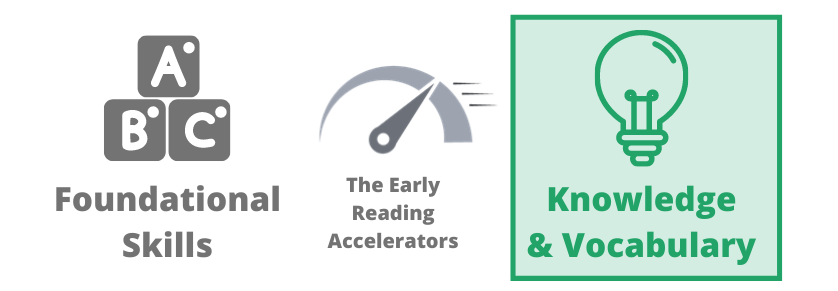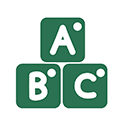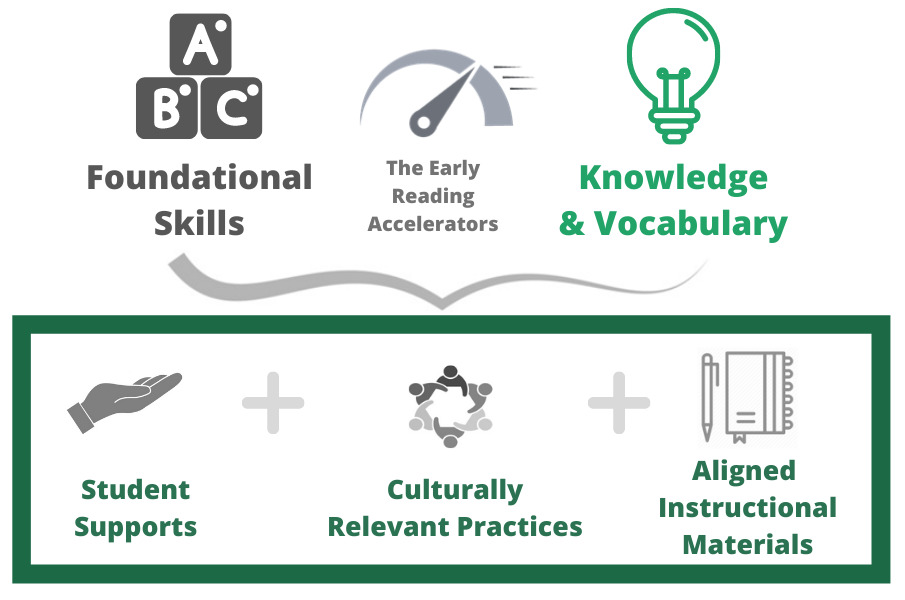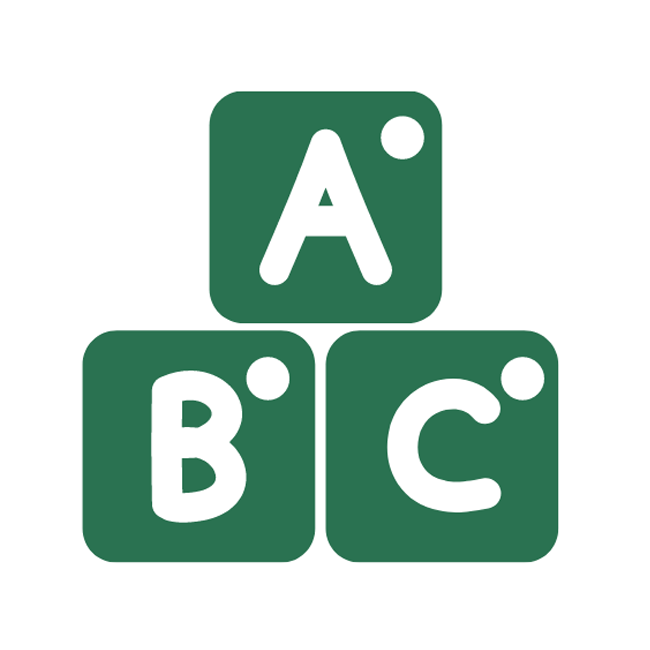Knowledge & Vocabulary (K-2)

Building knowledge is not an activity reserved for some, but the very pursuit of all learning; content knowledge is both the goal of and scaffold to literacy development.
Reading ability and knowledge about the world are tightly connected. The more knowledge we have, the more words we know, and the more likely we are to be able to use those things as we read. We must both leverage students' existing funds of knowledge and connect each student to a shared knowledge of the world by studying topics that represent multiple perspectives, identities, and experiences.
Related Collections
Building knowledge and vocabulary, together with foundational skills, accelerate early literacy and form the "Early Reading Accelerators." See this Quick Start Guide for an overview of the Early Reading Accelerators and how we can implement them for all students. To better understand Knowledge & Vocabulary, explore these additional Collections:
 Early Reading Accelerators. The Early Reading Accelerators are essential content all readers must access to become proficient. This Collection provides an overview of the Accelerators, with emphasis on ways to implement these concepts in the 2020-21 school year.
Early Reading Accelerators. The Early Reading Accelerators are essential content all readers must access to become proficient. This Collection provides an overview of the Accelerators, with emphasis on ways to implement these concepts in the 2020-21 school year.
 Foundational Skills. Foundational skills - print concepts, phonological awareness, phonics and word recognition, and fluency - are the building blocks of early reading. This Collection has resources, materials, and best practices for teaching these concepts to all students.
Foundational Skills. Foundational skills - print concepts, phonological awareness, phonics and word recognition, and fluency - are the building blocks of early reading. This Collection has resources, materials, and best practices for teaching these concepts to all students.
Three Key Ingredients
There are three key ingredients for building knowledge and vocabulary with early readers: (1) reading and rereading aloud knowledge-rich, complex texts; (2) engaging students with text sets; and (3) providing book baskets of topic-based options for independent reading.
.png)
.png)
Learn More About Building Knowledge
- Research Recap: Why the Early Reading Accelerators? Quick Sheet
- Building Knowledge: Expanding the World Through Reading Virtual Mini-Course
- The Importance of Building Knowledge (International Dyslexia Association) Digital Magazine
Read-Aloud
Knowledge-rich classrooms utilize texts and teaching that value students' identities, perspectives, and voices.
Through regular opportunities to think, talk, and write about rich stories and other read-aloud books, our students’ vocabulary and knowledge about how the world works grow exponentially. All readers must engage with texts that help them see, learn about, and understand new things, as well as texts that connect to their own lives and lived experiences. During these deep experiences with read-aloud of complex texts, students not only build new knowledge but also become a community of learners.
Read-Aloud Planning Resources
 Read-Aloud Project Lessons. Read-aloud lessons for grades K-2 center around a rich, complex text that will be read and reread over several days. Each of these lessons contain text-dependent questions for each day's read, selected high-leverage vocabulary, and a culminating task option. Select from these ready-to-use lessons texts that match topics you are planning to study with your students, reflect their lives and experiences, or strike you as engaging their interests. Or, use the template to create your own with texts of your own choosing.
Read-Aloud Project Lessons. Read-aloud lessons for grades K-2 center around a rich, complex text that will be read and reread over several days. Each of these lessons contain text-dependent questions for each day's read, selected high-leverage vocabulary, and a culminating task option. Select from these ready-to-use lessons texts that match topics you are planning to study with your students, reflect their lives and experiences, or strike you as engaging their interests. Or, use the template to create your own with texts of your own choosing.
The sampling of read-aloud lessons below includes some popular titles representing a range of topics and character identities. Find all K-2 lessons here.
Sample Read-Aloud Lessons
- Wangari's Trees of Peace Kindergarten Lesson
- The Tortilla Factory Kindergarten Lesson
- The Snowy Day Kindergarten Lesson
-
Kindergarteners in Elko, Nevada learn about road construction through a read-aloud of a complex text.
Text Sets
Students can grow as much as four times the vocabulary with connected texts (multiple resources on a topic).
In addition to complex read-alouds, all students must engage in a volume of reading in order to grow knowledge and vocabulary. To maximize this growth, use text sets: intentionally grouped sets of texts and media resources focused on a specific, conceptually-coherent topic - like Serena Williams, sharks, or ancient Egypt. Students might engage with text sets based on the topic of read-aloud anchor texts, their interests or identities, connections across content areas, or their language of instruction. No matter the topic, text sets provide an opportunity for students to rapidly increase their knowledge and word wealth.
.png)
 The Power of Text Sets. Learn about this easy, research-based, and fun way to become a stronger reader. This quick guidance document includes instructions for making your own text set, or where to find a pre-made text set online.
The Power of Text Sets. Learn about this easy, research-based, and fun way to become a stronger reader. This quick guidance document includes instructions for making your own text set, or where to find a pre-made text set online.
Text Set Resources
- Rolling Knowledge & Vocabulary Journal Student Resource
- Read-Aloud Lessons with Companion Text Sets Lesson Plans
- Press Play: Building Knowledge through Podcasts Blog Post
.png)
Book Baskets
Book baskets maximize student choice and knowledge building during independent reading.
Independent reading based on student-selected topics grows their knowledge and vocabulary through volume of reading, while providing authentic choice in their learning. Book baskets, collections of books (often from your classroom library) organized by topic, encourage young readers to select books based on their interests -- Civil Rights leaders, soccer, dinosaurs, you name it! -- rather than restricting them to their “level.”
.png)
 Weekly Reading Practice for Early Readers. Use this weekly routine to support your early readers with knowledge-building texts in a variety of settings, including synchronous, asynchronous, and with/without technology.
Weekly Reading Practice for Early Readers. Use this weekly routine to support your early readers with knowledge-building texts in a variety of settings, including synchronous, asynchronous, and with/without technology.
Resources for Book Baskets
- How to Create Book Baskets Blog Post
- Book Baskets that Build Knowledge, Vocabulary, and Engagement Blog Post
- Book Basket Project Resource Kit
.png)
A first grader in Brooklyn, New York reflects on why they prefer the topic library over the leveled library in this first-grade teacher’s classroom.
What About Leveled Reading?
In the words of Professor Alfred Tatum, Dean of the College of Education at the University of Illinois-Chicago, “Leveled texts lead to leveled lives.” Here's why, and what to do instead:
Equitable Implementation

How do we engage in the work of equitably building knowledge and vocabulary with early readers?
To implement the building knowledge & vocabulary Early Reading Accelerator equitably, we must consider student supports, culturally relevant content and practices, and aligned instructional materials.
Student Supports
.png) We all want to support each of our students to engage in rich, grade-level work. In doing so, we must “resist the inclination to ‘water down’ instruction and assignments for students with unfinished learning, students learning English, or those with other specialized learning needs. These students require the same challenging work and cognitive demands as their peers in order to develop academic skills and grow as scholars" (Council of Great City Schools). Use the resources below to support your students while engaging in the work of the knowledge and vocabulary accelerator.
We all want to support each of our students to engage in rich, grade-level work. In doing so, we must “resist the inclination to ‘water down’ instruction and assignments for students with unfinished learning, students learning English, or those with other specialized learning needs. These students require the same challenging work and cognitive demands as their peers in order to develop academic skills and grow as scholars" (Council of Great City Schools). Use the resources below to support your students while engaging in the work of the knowledge and vocabulary accelerator.
Supporting All Students with Building Knowledge & Vocabulary
English Learners
Students learning English bring with them the gifts of knowledge in multiple languages. We can honor this knowledge and use it to support text-based work in the classroom by leveraging students’ home language and providing thoughtful supports as students engage with complex texts, read-aloud, and other content-rich texts. This includes selecting some read-aloud texts that reflect familiar topics (or paired texts on the same topic for dual language environments), as well as connecting to texts that support new knowledge and vocabulary development. No matter the topic, we should leverage students' existing knowledge and language resources in service of building new understandings without “preempting the text, translating its content for students, telling students what they are going to learn in advance of reading a particular text, or ‘simplifying’ the text itself.”
Supports for English Learners
- Talk Moves (ELSF) Discussion Strategies
- Selecting and Using Academic Vocabulary in Instruction (including Supports for English Learners) Guidance Document
- Scaffolds to Support English Language Learners in Writing and Discussion Guidance Document
 Juicy Sentences Strategy. The juicy sentence is a strategy developed by Dr. Lily Wong Fillmore, specifically to address the needs of English learners while engaging with complex texts, and it is a tool that is useful for helping all students learn to deconstruct and reconstruct sentences from rich texts, and to understand how different language features contribute to meaning.
Juicy Sentences Strategy. The juicy sentence is a strategy developed by Dr. Lily Wong Fillmore, specifically to address the needs of English learners while engaging with complex texts, and it is a tool that is useful for helping all students learn to deconstruct and reconstruct sentences from rich texts, and to understand how different language features contribute to meaning.
-
Kindergarteners in this class of English learners in New York City engage in the Juicy Sentences strategy as they learn about butterflies. (From the Council of Great City Schools).
Culturally Relevant Practices
Instructional practices that are culturally relevant are responsive to and respect the value of all students’ backgrounds, languages, cultures, points of view, knowledge, and skills. When we infuse these practices into our work, we create more fulfilling, equitable, and positive experiences for all early readers.
 The Powers of Protocols for Equity. Use these protocols from Zaretta Hammond to create a more student-centered classroom.
The Powers of Protocols for Equity. Use these protocols from Zaretta Hammond to create a more student-centered classroom.
Learn More About Culturally Relevant Instruction
Critically Analyzing Texts
"The ways in which we are misrepresented, are marginalized, or deleted vary according to our identities... It's not just kids of color, kids from the margins who need diverse literature and media. It's all kids who need all stories about all kinds of people."- Ebony Elizabeth Thomas
Text Representation, Responsiveness, and Bias Analysis Resources
- Culturally Responsive Scorecard (Metropolitan Center for Research on Equity and the Transformation of Schools - NYU) Tool
- Assessing Bias In Standards and Curricular Materials (The Great Lakes Equity Center) Tool
- Classroom Library Questionnaire (Lee & Low Books) Tool
Instructional Materials
"Think carefully about the message [your] current curriculum sends to students about whose voices and stories are worthy of academic study."- Tricia Ebarvia
 Free Knowledge & Vocabulary Instructional Materials. Ready to try free, standards-aligned instructional materials to support your building knowledge and vocabulary work? Consider these open source programs.
Free Knowledge & Vocabulary Instructional Materials. Ready to try free, standards-aligned instructional materials to support your building knowledge and vocabulary work? Consider these open source programs. Coaches & Instructional Leaders
.png) Coaches and instructional leaders do important work to support teachers and students engaging in the building knowledge and vocabulary Early Reading Accelerator. This instructional priority should be a hallmark of high-quality professional learning and coaching in the early grades.
Coaches and instructional leaders do important work to support teachers and students engaging in the building knowledge and vocabulary Early Reading Accelerator. This instructional priority should be a hallmark of high-quality professional learning and coaching in the early grades.


.png)
